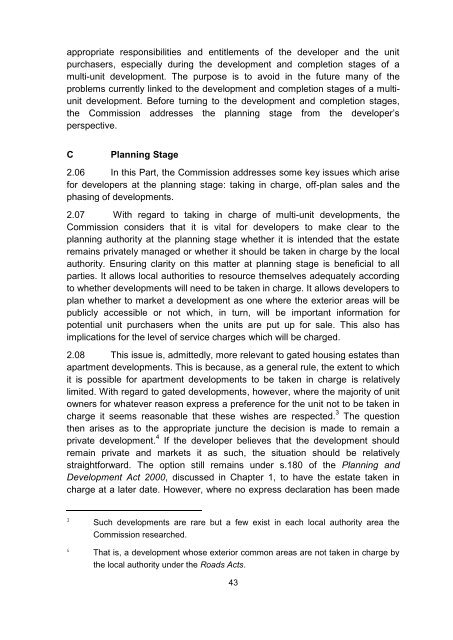Report on Multi-Unit Developments - Law Reform Commission
Report on Multi-Unit Developments - Law Reform Commission
Report on Multi-Unit Developments - Law Reform Commission
Create successful ePaper yourself
Turn your PDF publications into a flip-book with our unique Google optimized e-Paper software.
appropriate resp<strong>on</strong>sibilities and entitlements of the developer and the unit<br />
purchasers, especially during the development and completi<strong>on</strong> stages of a<br />
multi-unit development. The purpose is to avoid in the future many of the<br />
problems currently linked to the development and completi<strong>on</strong> stages of a multiunit<br />
development. Before turning to the development and completi<strong>on</strong> stages,<br />
the Commissi<strong>on</strong> addresses the planning stage from the developer‘s<br />
perspective.<br />
C<br />
Planning Stage<br />
2.06 In this Part, the Commissi<strong>on</strong> addresses some key issues which arise<br />
for developers at the planning stage: taking in charge, off-plan sales and the<br />
phasing of developments.<br />
2.07 With regard to taking in charge of multi-unit developments, the<br />
Commissi<strong>on</strong> c<strong>on</strong>siders that it is vital for developers to make clear to the<br />
planning authority at the planning stage whether it is intended that the estate<br />
remains privately managed or whether it should be taken in charge by the local<br />
authority. Ensuring clarity <strong>on</strong> this matter at planning stage is beneficial to all<br />
parties. It allows local authorities to resource themselves adequately according<br />
to whether developments will need to be taken in charge. It allows developers to<br />
plan whether to market a development as <strong>on</strong>e where the exterior areas will be<br />
publicly accessible or not which, in turn, will be important informati<strong>on</strong> for<br />
potential unit purchasers when the units are put up for sale. This also has<br />
implicati<strong>on</strong>s for the level of service charges which will be charged.<br />
2.08 This issue is, admittedly, more relevant to gated housing estates than<br />
apartment developments. This is because, as a general rule, the extent to which<br />
it is possible for apartment developments to be taken in charge is relatively<br />
limited. With regard to gated developments, however, where the majority of unit<br />
owners for whatever reas<strong>on</strong> express a preference for the unit not to be taken in<br />
charge it seems reas<strong>on</strong>able that these wishes are respected. 3 The questi<strong>on</strong><br />
then arises as to the appropriate juncture the decisi<strong>on</strong> is made to remain a<br />
private development. 4 If the developer believes that the development should<br />
remain private and markets it as such, the situati<strong>on</strong> should be relatively<br />
straightforward. The opti<strong>on</strong> still remains under s.180 of the Planning and<br />
Development Act 2000, discussed in Chapter 1, to have the estate taken in<br />
charge at a later date. However, where no express declarati<strong>on</strong> has been made<br />
3<br />
Such developments are rare but a few exist in each local authority area the<br />
Commissi<strong>on</strong> researched.<br />
4<br />
That is, a development whose exterior comm<strong>on</strong> areas are not taken in charge by<br />
the local authority under the Roads Acts.<br />
43

















